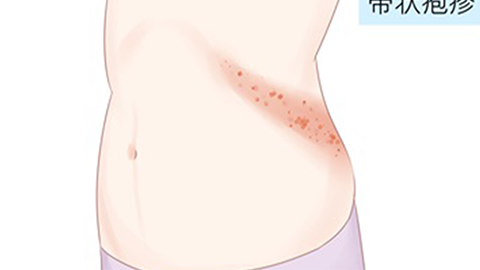How is snake-like herpes (herpes zoster) treated?
Snake-like waist typically refers to herpes zoster. Generally, herpes zoster may be caused by factors such as decreased immunity, aging, reactivation of varicella-zoster virus, viral spread, nerve damage, and others. It is recommended to seek timely medical attention, clarify the condition, and under a doctor's guidance, improve symptoms through antiviral treatment, pain relief, and nerve nourishment. Detailed explanations are as follows:

1. Decreased immunity: Long-term sleep deprivation, high stress levels, or excessive fatigue can weaken immune function, making it unable to suppress latent viruses. Adjust your sleep schedule, ensure 7-8 hours of sleep daily, and avoid staying up late; engage in 20 minutes of mild exercise daily and consume more high-quality proteins such as eggs and milk to enhance immunity and help inhibit viral replication.
2. Aging: Individuals over 50 years old naturally experience immune decline, allowing the virus to more easily overcome immune defenses. Supplement daily with vitamin C tablets, B-complex vitamins, and increase intake of fresh fruits and vegetables in the diet to strengthen the body's resistance and reduce the risk of disease onset.
3. Reactivation of varicella-zoster virus: After a previous case of chickenpox, the virus remains dormant in the nerve ganglia and can reactivate when immunity is low, causing symptoms. Patients should follow medical advice to use antiviral medications such as acyclovir tablets, valacyclovir tablets, or famciclovir tablets. Medication is most effective when started within 72 hours of symptom onset; avoid discontinuing treatment prematurely, which may lead to prolonged illness.
4. Viral spread: The virus spreading to the skin surface forms blisters, which are prone to secondary infection. Keep the affected area clean and dry, and avoid scratching; if blisters rupture, follow medical advice to apply topical medications such as mupirocin ointment, fusidic acid cream, or compound polymyxin B ointment to prevent infection.
5. Nerve damage: Viral invasion of nerves causes severe pain, which may result in postherpetic neuralgia. During the acute phase, follow medical advice to use pain-relief medications such as gabapentin capsules, pregabalin capsules, or ibuprofen sustained-release capsules.
In daily life, avoid spicy and irritating foods, quit smoking and alcohol consumption to reduce nerve stimulation. Avoid contact with others before blisters have crusted over, especially infants, young children, and pregnant women, to prevent virus transmission. Comprehensive treatment and care can promote rash resolution, relieve pain, and reduce the occurrence of complications.







